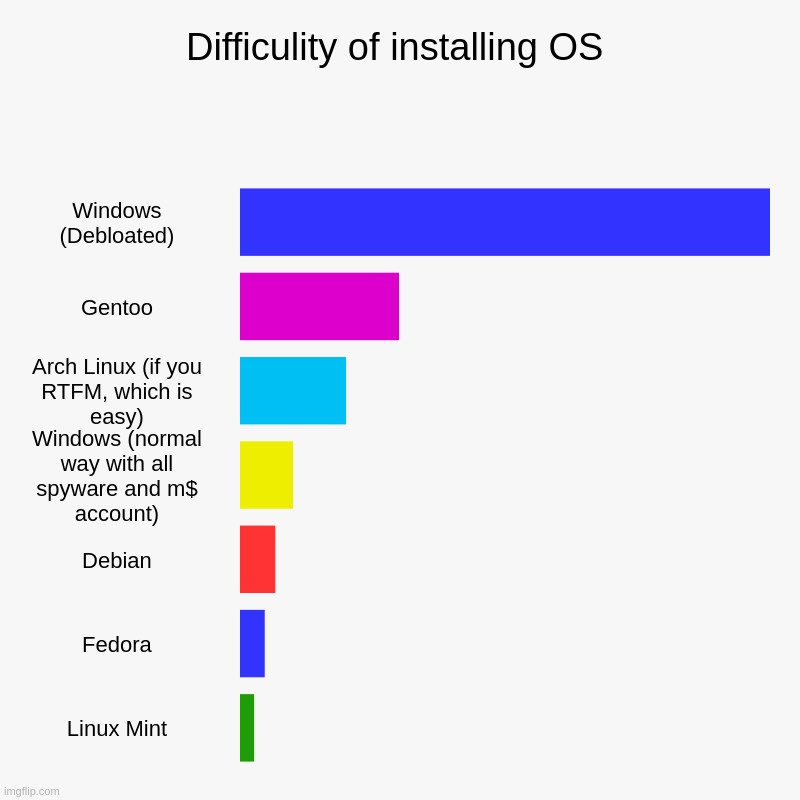this post was submitted on 21 Nov 2024
748 points (90.0% liked)
linuxmemes
28087 readers
968 users here now
Hint: :q!
Sister communities:
Community rules (click to expand)
1. Follow the site-wide rules
- Instance-wide TOS: https://legal.lemmy.world/tos/
- Lemmy code of conduct: https://join-lemmy.org/docs/code_of_conduct.html
2. Be civil
- Understand the difference between a joke and an insult.
- Do not harrass or attack users for any reason. This includes using blanket terms, like "every user of thing".
- Don't get baited into back-and-forth insults. We are not animals.
- Leave remarks of "peasantry" to the PCMR community. If you dislike an OS/service/application, attack the thing you dislike, not the individuals who use it. Some people may not have a choice.
- Bigotry will not be tolerated.
3. Post Linux-related content
- Including Unix and BSD.
- Non-Linux content is acceptable as long as it makes a reference to Linux. For example, the poorly made mockery of
sudoin Windows. - No porn, no politics, no trolling or ragebaiting.
4. No recent reposts
- Everybody uses Arch btw, can't quit Vim, <loves/tolerates/hates> systemd, and wants to interject for a moment. You can stop now.
5. 🇬🇧 Language/язык/Sprache
- This is primarily an English-speaking community. 🇬🇧🇦🇺🇺🇸
- Comments written in other languages are allowed.
- The substance of a post should be comprehensible for people who only speak English.
- Titles and post bodies written in other languages will be allowed, but only as long as the above rule is observed.
6. (NEW!) Regarding public figures
We all have our opinions, and certain public figures can be divisive. Keep in mind that this is a community for memes and light-hearted fun, not for airing grievances or leveling accusations. - Keep discussions polite and free of disparagement.
- We are never in possession of all of the facts. Defamatory comments will not be tolerated.
- Discussions that get too heated will be locked and offending comments removed.
Please report posts and comments that break these rules!
Important: never execute code or follow advice that you don't understand or can't verify, especially here. The word of the day is credibility. This is a meme community -- even the most helpful comments might just be shitposts that can damage your system. Be aware, be smart, don't remove France.
founded 2 years ago
MODERATORS
you are viewing a single comment's thread
view the rest of the comments
view the rest of the comments

Actually no. It's not Mint's decision whether to start the install USB with UEFI or BIOS. It actually depends on what the firmware chose to start and how the install medium is formatted. Some install media is only setup for BIOS booting, some for only UEFI, and some can do both. If the firmware detects the medium as supporting both then it should choose UEFI first but this depends on what settings you have in the firmware, and if you choose an option at a boot menu as boot menus allow you to override the default. When it comes to actually installing the OS most sane installation software will look at how it booted and install that way. So if it detects it was starting with UEFI it will configure the install to be UEFI, same if it was started with BIOS it will install as BIOS. How does it know? UEFI variables are one way. They can normally only be accessed if the system was started with UEFI.
If you truly wipe a drive you wipe the partition table as well. You say the table is outside the file system formatting, and this is sort of true, but they are both just data on the disk. Disk don't care where the partition table ends and the file system begins. In fact you don't even need a partition table at all. Unlike some other systems Linux will let you put a file system straight on the disk, the whole disk, with no partition table in sight. It's not recommended mind you, because it will freak Windows out if it sees it. Windows will see it as a blank disk and not so helpfully offer to format the thing. When I say format a disk, I mean the whole thing, partition table and all. It's also not possible to make a partition tableless disk bootable in UEFI. In BIOS it's possible though as BIOS doesn't read partition tables. It just needs a boot sector and that's it.
Also if you're trying to change a disk from MBR to GPT, and you don't care about data, you shouldn't be converting it. You should be formatting/wiping the whole thing and making a new partition table. Which is normally what it offers to do if you tell it to erase everything and install it.
Edit: Getting down voted for actually knowing how computers work and bothering to explain it. Shock horror.